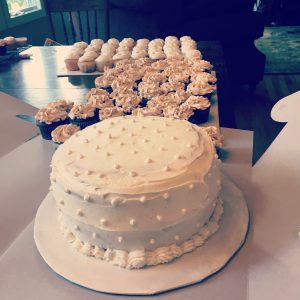Cary approves home kitchen operation
Adela Crandall Durkee for Chronicle Media — October 11, 2016
The Cupcake Law is a boon to area residents like Becky Dula Czarnik, who opened her business Sweet Lolly Cakes, in her home. (Photo by Adela Crandell Durkee/for Chronicle Media)
Cary is the latest among several municipalities to allow cottage or home kitchen operations. Under HB 5354, nicknamed the “Cupcake Law,” residents may sell baked goods from their home, at events, at farmers markets, or at roadside stands.
Home kitchen operations may not sell over the internet, to restaurants, or to retail stores. The law was started in response to the Madison County 11-year-old, Chloe Stirling, getting shut down by the health department.
The Cupcake Law is a boon to area residents like Becky Dula Czarnik, who opened her business Sweet Lolly Cakes, in her home. She hopes to save enough money for her own bakery, by selling out of her home, while she tends her two children.
Although the “Cupcake Law” took only months to pass through the Illinois government hoops and be signed into law, there are some caveats. The law is only valid if the local government adopts it. Cary joins Crystal Lake and Woodstock in adopting the law in McHenry County. Under Cary’s ordinance, and most others in Illinois, home kitchen operations must register with the municipality.
The home kitchen operation must follow McHenry County Department of Health sanitation rules. However, there are no provisions in the “Cupcake Law” for inspections. Keri Zeleski from the McHenry County Department of Health, explained that the only way her department would get involved is through a complaint, or possibly if the home kitchen violates the income requirement.
The goods at Sweet Lolly Cakes meets the “Cupcake Law’s” requirements that the product is not potentially hazardous. Dula Czarnik makes specialty cakes that can take up to 20 hours to prepare. Cakes, breads, cookies, candy, and a variety of baked goods are eligible for home kitchen operations. However, there are restrictions. No fillings or frostings that require refrigeration are allowed. Meringue and buttercreams are borderline. No focaccia-style breads with cheese or vegetables on top are allowed. Most fruit pies are allowed, but not cream pies.
The goods sold by home kitchen operations must be labeled as “produced in a home kitchen,” and meet common food labeling requirements such as, listing ingredients and common allergens.
The “Cupcake Law” allows people to start a small bakery business in their homes at little additional cost, and flexible working hours. This can be especially important for new business owners with small children. Income from a home kitchen operation is limited to $1,000 per month. Exceeding the limit requires the business owner to meet the stricter requirements for commercial kitchens.



